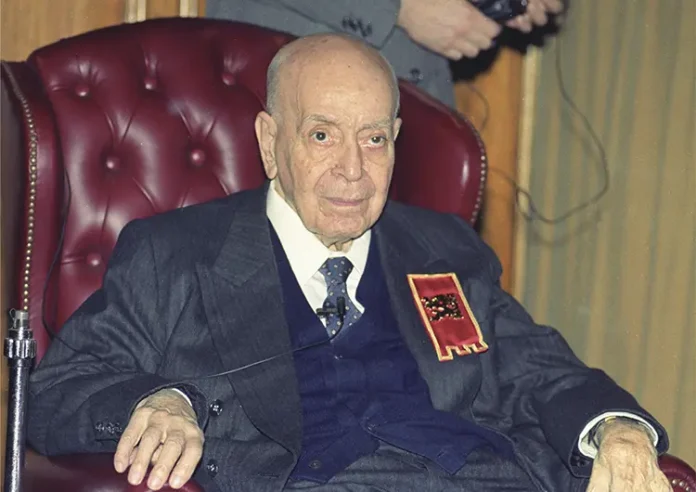When we turn our attention to the events of the Old Testament, we are struck by the grandeur of the prophetic mission. Moses divides the Red Sea in two, Elijah brings down fire from Heaven and Isaiah predicts wonders centuries and centuries in advance…
The procession of prophets, however, did not end when St. John the Baptist pointed out the Messiah he had announced. On the contrary, according to the categorical affirmation of St. Thomas Aquinas, God also continually sends them to the Church: “at all times there have not been lacking persons having the spirit of prophecy, not indeed for the declaration of any new doctrine of Faith, but for the direction of human acts.”1
It is true that every baptized person participates in the threefold mission of Our Lord Jesus Christ: priest, prophet and king.2 Nevertheless, Divine Providence dispenses the prophetic character with supreme largesse to some of his children, and it is through them that the Holy Spirit continues to speak in the New Testament.
A beacon that warns and guides
It is often believed that prophetism consists above all of predicting the future. However, this simplistic conception does not encompass the essence of the prophetic mission.3
Right from his first clash with the revolutionary ambience at the age of eleven, Plinio received a clear intuition about the future
The prophet can indeed be helped by a divine light to foretell the future, but this gift is almost an addendum to his charism which, since it is a grace granted for the benefit of others, has the purpose of favouring his neighbour, according to the words of the Apostle: “he who prophesies speaks to men for their upbuilding and encouragement and consolation” (1 Cor 14:3).
He therefore “knows how to read God’s plan in the fabric of events”4 and is thus able to warn humanity and guide it towards the fulfilment of God’s plans. We therefore see these men and women emerge in all times and places, becoming beacons of history. St. Benedict, St. Bernard, St. Catherine of Siena and St. Joan of Arc are examples of souls who went “beyond the ordinary limits of human activity to exercise an angelic ministry: to speak in the place of God.”5
So, well aware that the prophetic charism never leaves the Church, can we say that Plinio Corrêa de Oliveira was a prophet? By way of an answer, let us recall some facts from his life.
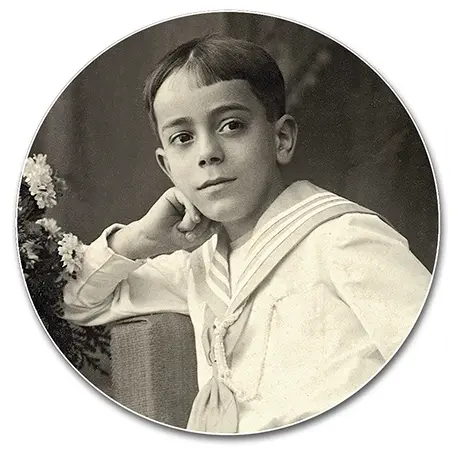
Grand predictions made by a boy
When Plinio had his first big shock at the age of eleven with the revolutionary environment, he already had a clear intuition about the future. In the courtyard of St. Louis School, he saw the perfection of the universe materialized in the vegetation, clouds and fauna; but above this natural harmony, he saw a higher, spiritual order, represented in the priests who passed by praying. “Suddenly,” he would later recall, “the following idea took hold in my mind: there was so much opposition between the innocence, righteousness and sanctity of the Church […] and the mentality of those bad students that, at a certain moment, the inanimate objects, the bamboo grove, the earth, the stones of the street and the residential structures would revolt against the aggression of sins, in legitimate self-defence.”6
A grandiose perspective loomed before him, in which divine punishment would purify a sinful world taken over by the Revolution. It was what he would later call “Bagarre”.7
These considerations, which could have been taken as mere childish impressions, were corroborated by the words of the Mother of God herself, although Plinio was unaware of them at the time. In fact, a few years earlier, the Virgin of Fatima had also announced, in the Cova da Iria, that tremendous calamities would ensue because of the wickedness of men.
A few years later, he was walking through Patriarch Square, in the centre of São Paulo. As the bells of St. Anthony’s Church tolled, a new portent filled him with joy. He glimpsed what appeared to be a grand procession, with military pomp, in which Mary Most Holy was acclaimed as sovereign of the world. Humanity, completely transformed, would then experience what the Church has been imploring for two millennia: “Thy Kingdom come!” It would be “an era in which people would receive the last teachings before history ends […]. The good that exists now will remain, but this era will be much better than all that, because it will be God’s rejoinder against evil. And the Church will be queen!”8
This promise that Providence made to him in the depths of his soul was the logical complement to the “Bagarre”: where the Revolution had once reigned, the splendid cathedral of the Reign of Our Lady would arise.
Here too, the promises of Fatima supported Plinio’s predictions: “In the end,” prophesied Mary Most Holy, “my Immaculate Heart will triumph!”
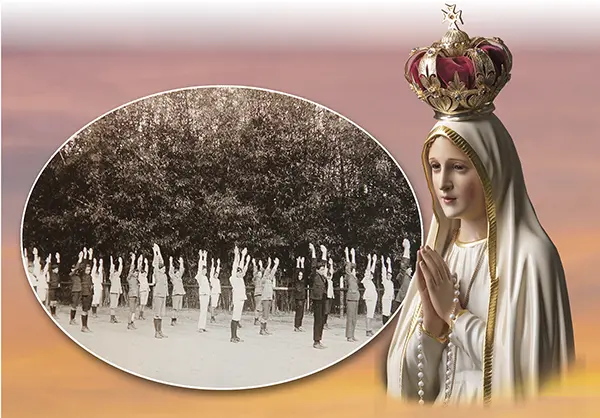
Alone, but victorious
Solemnity is part of grandeur, and this explains why great prophecies take time to be realized. What grounds, then, would we have to see in Dr. Plinio a prophetic charism, if his premonitions, confirmed by the mentioned apparitions, have not yet been verified by events? Let us turn our attention to the period that preceded and accompanied the Second World War: there we will be presented with some examples of the truly prophetic acuity that was granted to Dr. Plinio.
The message of Our Lady of Fatima confirmed the premonition he had had while contemplating the bamboo grove in the schoolyard
After the terrible drama of the First World War, the young Plinio, contrary to the general attitude of those around him, saw more severe scourges approaching in the near future. His concern was recorded in a letter from 1931, eight years before the start of the new conflict: “The storm will soon be upon us, with a world war as a mere preface. But this war will spread such confusion throughout the world that revolutions will break out everywhere, and the putrefaction of the sad ‘twentieth century’ will reach its peak.”9
The war broke out in 1939. On both sides of the conflagration, apparently antagonistic and irreconcilable ideologies were simmering: Nazism and Communism. However, contrary to world public opinion, Dr. Plinio pointed out a veiled but real identity of doctrines and objectives between the two systems. And, in the Legionário newspaper, he denounced a forthcoming alliance between the alleged rivals: “While all the camps are defining themselves, an increasingly clear movement is taking place. It is the doctrinal fusion of Nazism and Communism.”10 Considered from a human point of view, such a prediction would be at least an exaggeration, if not outright nonsense. And that is how Dr. Plinio’s warning was received by society, generating a veritable scandal.
However, after a few months, the uproar turned into stupefaction, as the prognosis was fulfilled to the letter: in August 1939, the Ribbentrop-Molotov Pact consolidated the Nazi-Communist union.
Many other events like these, reported in advance by Dr. Plinio, confirmed the accuracy of his warning.
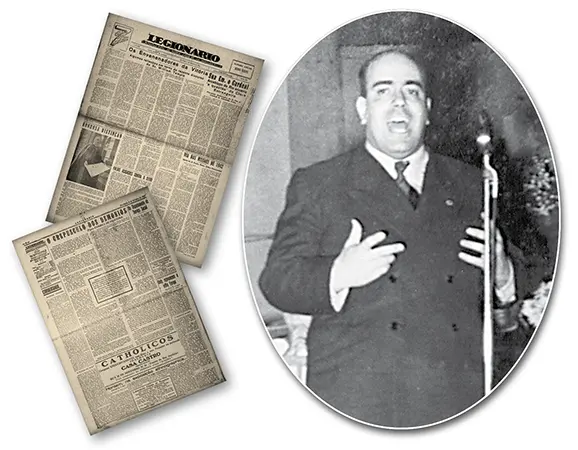
Leading humanity towards God’s designs
However, as we said above, prophecy does not essentially consist in predicting the future. Such announcements, fulfilled in time, serve above all to prove the authenticity of the mission. The core of this vocation lies, as the Aquinate indicates in the quote transcribed above, in “the direction of human acts.”
More than predicting the future, the essence of the prophetic vocation is to guide human activity in the direction indicated by God’s plan
In Plinio Corrêa de Oliveira, this aspect also became clear from the first stage of his public life. His words inflamed crowds, making him a natural leader. “It was not a position,” he recalled, “it was not a function; it was a prestige, an influence, an importance, a leadership acclaimed by all.”11
So much so that at the age of twenty-four he was elected by a wide margin of votes as a deputy to the Constituent Assembly of 1934, to defend the interests of the Church.
Another episode further demonstrated the power of attraction with which grace invested him, so that he could lead society on the right path. In 1942, the Fourth National Eucharistic Congress brought together a million Catholics in São Paulo’s Anhangabaú Valley. Before that vast audience, Dr. Plinio gave a speech about the immense vocation granted by God to Brazil. The crowd, hanging on the orator’s every word, erupted into applause and acclamations at the end of the speech: “Plinio! Plinio! Plinio!”
Occasions like these would be repeated throughout Dr. Plinio’s epopee – so many that they could not even be listed in one article – as a consequence of the charism that impelled him to lead humanity in the direction set by Providence.
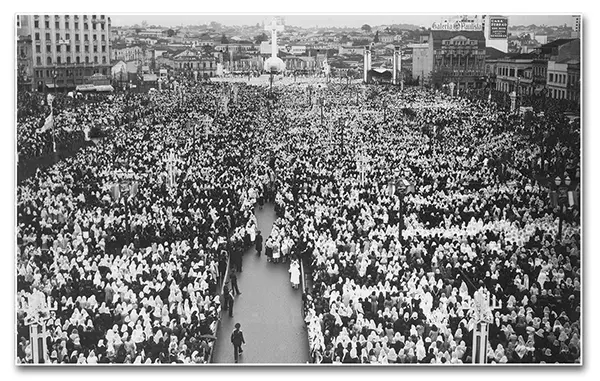
The immortalized prophecy
But what does it mean to move the world, as compared with moving the Creator? Well, perhaps this is the most transcendent aspect of the prophetic vocation. Through his prayers and his faithfulness, the prophet must hasten, for the greater glory of God, the fulfilment of the promises he has received.
It is above all through well-accepted suffering that the prophet must hasten the fulfilment of the promises that were entrusted to him
In what way? Not just by proclaiming the prophecy, but by personifying it. “Prophets,” teaches St. Irenaeus, “do not prophesy by word alone, but also […] by their conduct and their actions.”12 In the same way, Plinio Corrêa de Oliveira realized in himself the prophecies he announced.
His innocence, never touched by the revolutionary spirit, anticipated that defeat of the Revolution which he had glimpsed in the courtyard of St. Louis School. His intense devotion to Our Lady brought closer the days of the Reign of Mary, foreseen in Patriarch’s Square. The victory of the Blessed Virgin was already becoming a reality in his heart!
Only one element remained for this living prophecy to take on its full magnitude: the cross. As will be seen in detail in another article,13 the Queen of Prophets did not deprive her chosen one of this crown, allowing him to struggle during his agony with the trial of disillusionment: God had placed in his soul the certainty that he would see the Reign of Mary established; but where was the realization of these promises in a world where the Revolution still prevailed?
On his deathbed, Dr. Plinio heard the answer from the lips of Monsignor João himself, the disciple who would continue his battle for the consummation of such great prophecies: “You might say: ‘So, how is the mission being fulfilled?’ The mission is being fulfilled like this, in the most perfect way! Because suffering is the best way to accomplish it.”14 ◊
Notes
1 ST. THOMAS AQUINAS. Summa Theologiæ. II-II, q.174, a.6, ad 3.
2 Cf. CCC 783.
3 Cf. ST. THOMAS AQUINAS, op. cit., q.171, a.3.
4 CIARDI, Fabio. I fondatori, uomini dello Spirito. Roma: Città Nuova, 1982, p.298.
5 CLÁ DIAS, EP, João Scognamiglio. O dom de sabedoria na mente, vida e obra de [The Gift of Wisdom in the Mind, Life and Work of] Plinio Corrêa de Oliveira. Città del Vaticano-São Paulo: LEV; Lumen Sapientiæ, 2016, v.II, p.198.
6 CORRÊA DE OLIVEIRA, Plinio. Notas autobiográficas[Autobiographical Notes]. São Paulo: Retornarei, 2010, v.II, p.543.
7 From the French, literally: confusion.
8 CORRÊA DE OLIVEIRA, op. cit., p.544-545.
9 CORRÊA DE OLIVEIRA, Plinio. A José Pedro Galvão de Souza. In: Opera Omnia. São Paulo: Retornarei, 2008, v.I, p.24.
10 CORRÊA DE OLIVEIRA, Plinio. Entre o passado e o futuro [Between the Past and the Future]. In: Legionário. São Paulo. Year XII. No.329 (Jan. 1, 1939), p.2.
11 CORRÊA DE OLIVEIRA, Plinio. Conversation. São Paulo, 7/3/1995.
12 ST. IRENEAUS OF LYON. Adversus hæreses. L.IV, c.20, n.8: SC 100, 650.
13 A Triumph Obtained by Blood, in this issue.
14 CLÁ DIAS, EP, João Scognamiglio. O dom de sabedoria na mente, vida e obra de [The Gift of Wisdom in the Mind, Life and Work of] Plinio Corrêa de Oliveira. Città del Vaticano-São Paulo: LEV; Lumen Sapientiæ, 2016, v.V, p.454.


